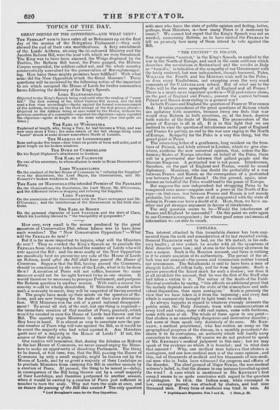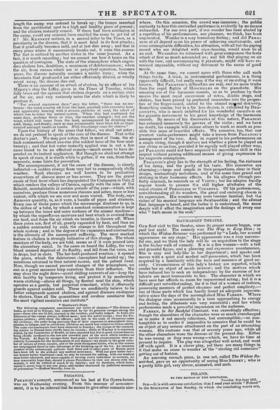CHOLERA.
THE interest attached to this formidable disease has been aug- mented from the rank and consideration of its last reported victim. General DIEMTSCH went to bed, on the 9th instant, in his ordi- nary health ; at two o'clock he awoke with all the symptoms of fatal disorder upon him ; and at one in the following afternoon he was a corpse. Such is the Russian account, and there is nothing. in it to create suspicion of its authenticity. The period of the at- tack was not unusual—the course and termination neither hurried nor uncommon. The Sabalkanski is said to have been a man of sluggish habits, of infirm body, and far from temperate. Such a person presented the fairest mark for such a disease ; nor does it at all invalidate the account, that he was the first of the Staff who had fallen a victim to it. The notice of the death of the Field- Marshal concludes by saying, "this affords an additional proof that the malady depends more on the state of the atmosphere and indi- vidual disposition, than upon contagion." Such is precisely the view that we have taken of it from the beginning ; and every fact which is successively brought to light tends to confirm it. As always happens in regard to whatever strongly interests the public mind, the Daily Journals teem with communications of every kind and value, some with real names, some with fictitious, some with none at all. The whole of these agree in one point—. that cholera is an exceedingly dangerous and destructive disorder ; but none of them speak very decisively of its cure. Mr. KEN- NEDY, a medical practitioner, who has written an essay on the. geographical progress of the disease, in a monthly periodical,* de- clares it to be contagious, on authority which will hardly carry. conviction to his readers. Of course we do not pretend to speak of Mr. KENNEDY'S medical judgment in this case; but we may speak of the evidence on which it is founded ; and to what does. that amount ? Why, one medical man believes that cholera is. contagious, and one non-medical man is of the same opinion ; and this, out of thousands of medical and ten thousands of non-medi- cal men who in India have witnessed the progress and effects of the disorder. The chief ground of Major SYKES, the non-medical witness's belief, is, that the disease in one instance travelled against the wind ! A case which is mentioned in Mr. KENNEDY'S first essay,t seems to us quite conclusive with regard to the question of contagion. In 1818, the Indian army, while encamped in low, swampy ground, was attacked by cholera, and lost nine thousand men. Every form of medicine was tried , in vain. At
• Eraglithwarealtagazine, Nos. I and IL j Idem, p. 20.
length the camp was ordered to break up ; the troops marched from the pestilential spot to a high and healthy piece of ground ; and the cholera instantly ceased. If there had been contagion in the camp. could any removal have enabled the army to get rid of it ? Mr. KENNEDY notices, in a second letter to the Times, as a peculiarity in the disease, that it is most fatal in its first attacks ; that it gradually becomes mild, and at last dies away ; and that in every place where it successively breaks out, it runs this course. The fact is noticed by another writer in the same journal. As a fact, it is worth recording ; but we cannot see how it bears on the question of contagion. The state of the atmosphere which engen- ders cholera has, doubtless, a maximum cf deleteriousness; when the air, from causes which are in perpetual operation, becomes purer, the disease naturally assumes a milder form ; when the miasmata that produced it are either effectually diluted, or wholly swept away, the disease dies out. There is an account of an attack of cholera, by an officer of his Majesty's ship the Liffey, given in the Times of Tuesday, which fully bears out the opinion that cholera depends on a certain state of the air, and very curiously notes the state which is likely to produce it. "For several successive days," says the letter, "there was no sea- breeze : the wind coming off from the land,- parched with excessive heat, and apparently bearing with it minute particles of sand, the effect of which was to relax the animal system. When this had continued for some days, perhaps three or four, the weather changed ; but not the wind, which still came from the land, accompanied by drizzling rain, cold, damp, and deadly, such as may occasionally have been felt or expe- rienced amongst vaults or tombs. With this change came the cholera."
Upon the history of the cases that follow, we shall not enter; we do not pretend to speak of the cure of the disease. That is the doctor's part. We may just notice, that in most of them, the at- tack commenced about sun-rise (the coldest hour of the four-and- twenty) ; and that hot water instantly applied was in not a few cases found to be an effectual remedy—much seems to have de- pended on its instant application. But though we shall not attempt to speak of cure, it is worth while to gather, if we can, from these accounts, some hints for prevention.
The accompaniment, if not the cause of the disease, is clearly indicated—a sudden change from very hot to comparatively chilly weather. Such changes are well known to be productive everywhere of disease more or less severe. They are the grand cause of that fever which has depopulated the Campagna in Italy, which renders the valleys of Corsica, equally with the isles of the Scheldt, uninhabitable at certain periods of the year—which, with ourselves, produce those numerous rheums and aches, more or less violent, with which we are ever and anon visited. The body, says ADDISON quaintly, is, as it were, a bundle of pipes and strainers. Every one of those pores which the microscope discloses to us, is the orifice of a tube, by which a constant communication is kept up between the inner and outer surfaces of the animal machine— by which the superfluous moisture and heat which is evolved from our food, and from the air which we breathe, is thrown off. When these pores are, first of all, greatly expanded by heat, and then on a sudden contracted by cold, the change is felt throughout the whole system ; and in the degree of the expansion and contraction is the intensity of the consequent suffering. The most marked feature in cholera is strongly indicative of this change. The whole moisture of the body, we are told, seems as if it were poured into the alimentary canal. In the cases on board the Liffey, the very blood seemed deprived of its fluidity, and fell from the veins, not in drops, but in clots. The hot-bath produced reaction ; it opened the pores, which the deleterious atmosphere had sealed up ; the secretions returned to their natural course, and the patient lived. Now, though we cannot prevent changes of the atmosphere, we can in a great measure keep ourselves from their influence. We may shun the night dews—avoid chilling currents of air—keep the skin healthy by temperate living, and protect it by moderately warm clothing—above all things, by flannel next the skin, which operates as a gentle, but perpetual stimulant, while it effectually guards against sudden cold. These we confidently believe to be better safeguards against cholera, and against diseases analogous to cholera, than all the quarantines and cordons sanitaires that the most vigilant executive can institute.* ' • Matthews's Diary.
The following completely corroborates our views of cholera—" The disease in
India, as well as in Europe, has committed by far its greatest ravages among the -poor—those who are ill.fed, exposed to the weather, and badly lodged. In India the followers of the camps always suffered most; next the native troops ; then the Eu- sopean soldiers ; after them the officers ; and last in the scale of frequency came
the civilians; the order being precisely that of their exposure to atmospheric vicis- situdes, to fatigue, and to privattons. Children are much less subject to it than adults.
The same circumstances have been observed in Europe; the troops of the contend- ing armies in Poland have chiefly been its victims ; while at Warsaw it is expressly stated, by the Committee of Health, to have attacked but few in good circumstances, being chiefly confined to the low and crowded part of the tonal which borders on the Vistula. At Riga its ravages have been great ; but the circumstances were pe- culiarly favourable for the development of any disease—we allude to the great num- ber of sailors of every country, and of the most dissipated habits, who at this season are congregated there to take advantage of the breaking-up of the ice. An immense number of the unfortunate patients both there and in other parts of Russia must have been left to die without any medical assistance. With our poor better fed- -our houses better ventilated—and, we may be excused for adding, with our medical men better educated, and more capable of turning every indication to account, we may reasonably hope that, should it please Providence to visit our shores with this malady, It will be robbed of much of its fatality; and its duration, which fortu- nately is never long in any one place, still farther shortened by judicious measures of precaution."—Medical Gazette, June 25.



























 Previous page
Previous page